Unit-2-I’ll-help-to-clean-up-the-city-parks.教案
八年级英语下册教案:Unit 2 I’ll help to clean up the city
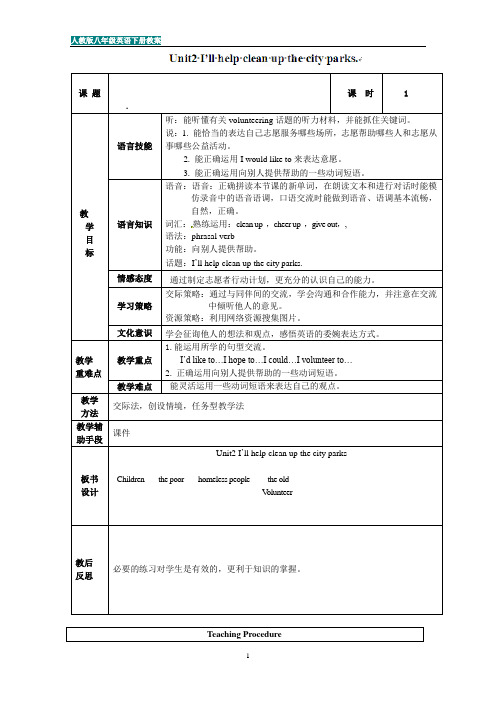
课题.课时 1教学目标语言技能听:能听懂有关volunteering话题的听力材料,并能抓住关键词。
说:1. 能恰当的表达自己志愿服务哪些场所,志愿帮助哪些人和志愿从事哪些公益活动。
2. 能正确运用I would like to来表达意愿。
3. 能正确运用向别人提供帮助的一些动词短语。
语言知识语音:语音:正确拼读本节课的新单词,在朗读文本和进行对话时能模仿录音中的语音语调,口语交流时能做到语音、语调基本流畅,自然,正确。
词汇:熟练运用:clean up ,cheer up ,give out,,语法:phrasal verb功能:向别人提供帮助。
话题:I’ll help clean up the city parks.情感态度通过制定志愿者行动计划,更充分的认识自己的能力。
学习策略交际策略:通过与同伴间的交流,学会沟通和合作能力,并注意在交流中倾听他人的意见。
资源策略:利用网络资源搜集图片。
文化意识学会征询他人的想法和观点,感悟英语的委婉表达方式。
教学重难点教学重点1.能运用所学的句型交流。
I’d like to…I hope to…I could…I volunteer to…2. 正确运用向别人提供帮助的一些动词短语。
教学难点能灵活运用一些动词短语来表达自己的观点。
教学方法交际法,创设情境,任务型教学法教学辅助手段课件板书设计Unit2 I’ll help clean up the city parksChildren the poor homeless people the oldV olunteer教后反思必要的练习对学生是有效的,更利于知识的掌握。
Teaching ProcedureStages/TimingTeachet ers’ activities Students’ activities MethodologyStep 1 Warming upStep 2 lead-inStep 3 practice T: Could you please help me close thedoor?Could you please help me open thewindow?Thanks for your help.Do you know there is a special day inDecember. On that day, many peoplewo uld like to help others who need help.Do you know when is it and what day is itthat day?Introduction of “International V olunteerDay”Time: December 5th.They give people help without hope ofrewardLet’s enjoy some pictures.Show some pictures.They help to sent food to the poor people.They help to examine the health conditionof the old.They help to cut the hair of the poor.They help to clean the yards of thecommunity.They help to clean the bus-stop.What else could we do to help people?Show some other pictures.I’d like to/I hope to/I could/I volunteerto:help children with their schoolwork.visit the old in an old people’s home.help watch the traffic.give our old boo ks to “Hope School”.cheer up sick kids in the hospital.…1a. Look at the ways y ou could helppeople in thepicture. Then list other ways.Other ways you could help people___________________________________________________________________________________________________Ss do it.Ss think about it.Ss: They help to sentfood to the poorpeople.They help toexamine the healthcondition of the old.They help to cut thehair of the poor.They help to cleanthe yards of thecommunity.They help to cleanthe bus-stop.What else could wedo to help people?Ss: I’d like to/Ihope to/I could/Ivol unteer to:Ss do 1a.复习,进一步巩固落实。
八年级英语下册 2 I'll help to clean up the city par
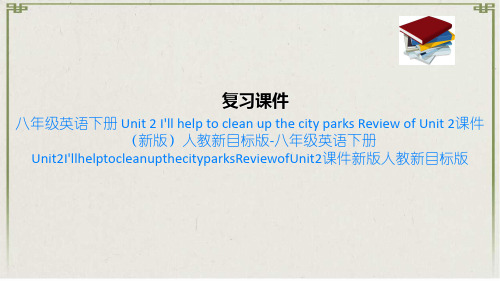
3. As a volunteer, the girl wants to visit sick kids in
the hospital _______ them up.
A. to cheer
B. cheer
C. cheering
D. cheered
短语动词
短语动词是由动词加介词、副词或 其他词构成的固定词组或习语,其作用 和动词相近。
9. I’m __e_x_c_it_e_d_ (excite) about your change. I’m happy you are a good student now.
三、单项选择。
1. The teenagers often help ______ water and
food to those people in need.
5. I’m able to have a “dog helper” because of your _k_i_n_d_n_e_s_s (kind).
6. Do you have any __d_i_ff_i_c_u_lt_ie_s__ (difficult) in learning English?
viewofUnit2课件新版人教新目标版
看看远处,要保护好眼睛哦~站起来
动一动,久坐对身体不好哦~
3. It took me _se_v_e_r_a_l (一些) days to finish the work. 4. To our __j_o_y__ (高兴), we arrived home before it
7. After six months of __tr_a_i_n_in_g__ (train), he is now good at playing basketball.
Unit2-I'll-help-to-clean-up-the-city-parks全单元课件
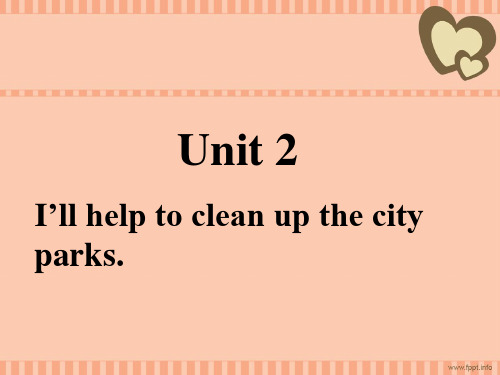
hospital to cheer them up.
_2__ The boy could give out food at the food
bank.
_4__ The girl could volunteer in an after-school
study program to teach kids.
food at the food bank
If I had lots of money, I would…
set up a Hope School
建立、建造
=establish
help poor kids
volunteer in an after-school study program
What other ways we could help people?
_______Y_o__u__c_o_u_l_d__h_e_l_p__t_h_e__p_a_s_s_e_n_g__e_r_s_w__i_th___t_h_e_ir luggage. Y_o_u__c_o_u__ld__h__e_lp__p__la__n_t_t_r_e_e_s__a_n_d__g_r__a_s_s_t_o_________ b_e_a__u_t_if_y__y_o_u__r_h__o_m__e_t_o_w__n_.______________________ Y__o_u__c_o_u_l_d__h_e_l_p__t_h_e__o_l_d_p__e_o_p_l_e__c_r_o_s_s_t_h__e_s_t_r_e_e_t_._ Y__o_u__c_o_u_l_d__h_e_l_p__t_h_e__p_o_l_i_c_e_c_a__tc_h__t_h_e__t_h_i_e_v_e_s_.____ Y__o_u__c_o_u_l_d__h_e_l_p__t_h_e__o_l_d_p__e_o_p_l_e__c_le__a_n__u_p__t_h_e_i_r_h__ouses. Y__o_u__c_o_u_l_d__g_i_v_e__th__e_m__o__n_e_y__t_o_t_h__e_c_h__a_r_i_ty__a_n__d__h_elp the poor people.
八年级英语下册 Unit 2 I'll help to clean up the city (1)
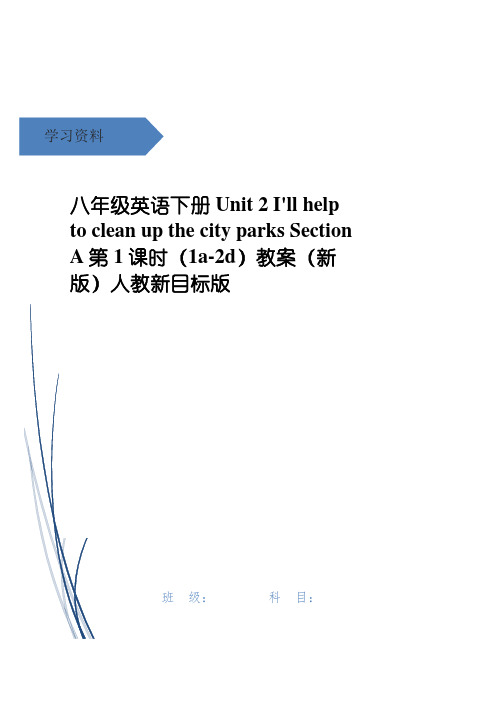
学习资料Unit 2 I'll help to clean up the city parks Section A第1课时(1a—2d)Section A 单词cheer v。
欢呼;喝彩 volunteer v。
义务做;自愿做n。
志愿者sign n.标志;信号notice n.通知;通告;注意 v.注意到;意识到lonely adj。
孤独的;寂寞的several pron.几个;数个;一些strong adj.强烈的;强壮的feeling n.感觉;感触satisfaction n。
满足;满意 joy n。
髙兴;愉快owner n.物主;主人 journey n。
(尤指长途)旅行;行程raise v.募集;征集alone adv。
独自;单独midnight n。
午夜;子夜短语clean up打扫(或清除)干净cheer up (使)变得更高兴;振奋起来give out分发;散发come up with想出;提出(主意、计划、回答等)put off推迟hand out 分发call up打电话给(某人);征召used to曾经……;过去……care for照顾;非常喜欢try out参加……选拔;试用句型1.They told me stories about the past and how things used to be.他们给我讲过去的生活经历,讲过去是什么样子的。
2.…but I want to learn more about how to care for animals.……但是我想更多地了解如何照料动物。
3。
I can do what I love to do and help others at the same time.我能做我喜欢做的事情,同时也能帮助别人。
Section B 单词repair v。
修理;修补 fix v.修理;安装broken adj。
破损的;残缺的wheel n。
八年级英语下册 Unit 2 I'll help to clean up the city par

2017春八年级英语下册Unit 2 I'll help to clean up the city parks(第5课时)练习(新版)人教新目标版编辑整理:尊敬的读者朋友们:这里是精品文档编辑中心,本文档内容是由我和我的同事精心编辑整理后发布的,发布之前我们对文中内容进行仔细校对,但是难免会有疏漏的地方,但是任然希望(2017春八年级英语下册Unit 2 I'll help to clean up the city parks(第5课时)练习(新版)人教新目标版)的内容能够给您的工作和学习带来便利。
同时也真诚的希望收到您的建议和反馈,这将是我们进步的源泉,前进的动力。
本文可编辑可修改,如果觉得对您有帮助请收藏以便随时查阅,最后祝您生活愉快业绩进步,以下为2017春八年级英语下册Unit 2 I'll help to clean up the city parks(第5课时)练习(新版)人教新目标版的全部内容。
Unit 2 I'll help to clean up the city parks第五课时Section B(2a~2e)Ⅰ.根据句意及汉语提示填写单词。
1.The poor old woman was blind(失明的).2.Jenny,can you open(打开) the door for me?3.How clever(聪明的) yo u are!You work it out!4.I read the story,but I didn’t understand(理解) it。
5.Your brother seemed different from before.He changed(改变) a lot.Ⅱ。
用括号内所给单词的适当形式填空。
6.We felt excited(excite) about the good news.7.Tom,take these letters(le tter) to Mr。
unit2-i'll-help-clean-up-the-city-parks.知识点总结
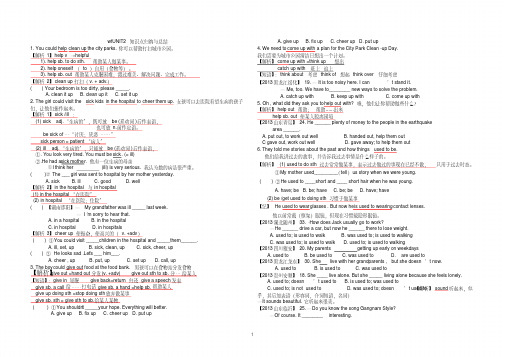
A . lonely; alone
B. aloneห้องสมุดไป่ตู้ lonely
C. lonely; lonely
D . alone; alone
【 2013 上海】 67. My old neighbor Charles felt _______ after his children moved out.
A. lonely
B. sick, clean, up C. sick, cheer, up
( ) ② He looks sad .Let’s ___ him___.
A. cheer , up
B. put, up
C. set up D. call, up
3. The boy could give out food at the food bank. 男孩可以在食物站分发食物
B. safely
C. angrily
D. happily
9. We should listen to them and care for them . 我们应该倾听他们说话并且关心他们。
【解析】 care for 照看;照顾; 照料
【 2013 湖北黄石 2】 33. Many students in our school _______ the old and they usually offer
【解析】give out =hand out 分发 (v. +adv) give out sth to sb. 分 ….给某人
【短语】:give in 屈服 give back=return 归还 give a speech 发表
give sb. a call 给 …… 打电话 give sb. a hand =help sb. 帮助某人
人教新目标英语八年级下册:Unit 2 I'll help to clean up the city

Unit 2 I’ll help to clean up the city parks.Name Group ClassPeriod 4Section B 1a-2e【Topic】Volunteering and charity【Get ready before class】温故知新一、选词填空:cut up, give out, come up, clean up, put off, cheer up, call up, help with, write down.1. Please ___________________ the table after supper.2. He________________ with a good idea yesterday.3. Your daughter is sad. Why not __________her________?4. Teachers _______________ apples to every child.5. We ______________ the party because it rained very hard that day.6. _______________ these potatoes. I’ll cook them.7. I will _______________ some housework after I finish my work.8. Please _______________ what I said just now.9. He ______________ his wife as soon as he arrived in Shanghai.二、Fill in the blanks.用做给词的适当形式填空1. My brother wants ___________ (be) a pilot.2. You’ll never learn _____________ (ride) a bike if you don’t practice.3. Mike taught his grandpa how ____________ (use) the computer.4. The students decided ______________ (work) out the problem by themselves.5. He volunteers _____________ (work) on the farm.6. We can make plans ____________(visit) the old people in the old people’s home.7. We can do what we can do ___________(help) other people.新知探究一、Listen and read the new words. 预习生词,摘抄并翻译单词所在的句子.repair: ( )( )fix: ( )( )broken: ( )( )disabled: ( )( )二、Read the sentences in 1a and finish 1a and 1b.三、词海拾贝。
Unit 2 I'll help to clean up the city parks.
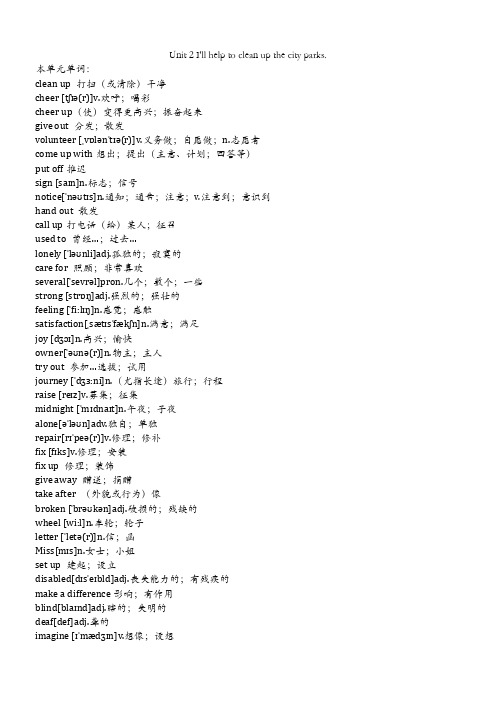
Unit2I'll help to clean up the city parks.本单元单词:clean up打扫(或清除)干净cheer[tʃɪə(r)]v.欢呼;喝彩cheer up(使)变得更高兴;振奋起来give out分发;散发volunteer[ˌvɒlənˈtɪə(r)]v.义务做;自愿做;n.志愿者come up with想出;提出(主意、计划;回答等)put off推迟sign[saɪn]n.标志;信号notice[ˈnəʊtɪs]n.通知;通告;注意;v.注意到;意识到hand out散发call up打电话(给)某人;征召used to曾经…;过去…lonely[ˈləʊnli]adj.孤独的;寂寞的care for照顾;非常喜欢several[ˈsevrəl]pron.几个;数个;一些strong[strɒŋ]adj.强烈的;强壮的feeling[ˈfi:lɪŋ]n.感觉;感触satisfaction[ˌsætɪsˈfækʃn]n.满意;满足joy[dʒɔɪ]n.高兴;愉快owner[ˈəʊnə(r)]n.物主;主人try out参加…选拔;试用journey[ˈdʒɜ:ni]n.(尤指长途)旅行;行程raise[reɪz]v.募集;征集midnight[ˈmɪdnaɪt]n.午夜;子夜alone[əˈləʊn]adv.独自;单独repair[rɪˈpeə(r)]v.修理;修补fix[fɪks]v.修理;安装fix up修理;装饰give away赠送;捐赠take after(外貌或行为)像broken[ˈbrəʊkən]adj.破损的;残缺的wheel[wi:l]n.车轮;轮子letter[ˈletə(r)]n.信;函Miss[mɪs]n.女士;小姐set up建起;设立disabled[dɪsˈeɪbld]adj.丧失能力的;有残疾的make a difference影响;有作用blind[blaɪnd]adj.瞎的;失明的deaf[def]adj.聋的imagine[ɪˈmædʒɪn]v.想像;设想difficulty[ˈdɪfɪkəlti]n.困难难题open[ˈəʊpən]v.开;打开door[dɔ:(r)]n.门carry[ˈkæri]v.拿;提;扛train[treɪn]v.训练;培训excited[ɪkˈsaɪtɪd]adj.激动的;兴奋的training[ˈtreɪnɪŋ]n.训练;培训kindness[ˈkaɪndnəs]n.仁慈;善良clever[ˈklevə(r)]adj.聪明的;聪颖的understand[ˌʌndəˈstænd]v.理解;领会change[tʃeɪndʒ]v.&n.变化;改变interest[ˈɪntrəst]n.兴趣;关注v.使感兴趣;使关注sir[sɜ:(r)]n.先生(用于正式信函中对不知名的男性收信人的称呼时,写为Sir)madam[ˈmædəm]n.夫人;女士(用于正式信函中对不知名的女性收信人的称呼时,写为Madam)Mario['mærɪəʊ]马里奥(男名)Jimmy[ˈdʒɪmi]吉米(男名)重点单词详解:1.clean up意为“打扫(或清除)干净,是“动词+副词”结构的短语例句:He often helps his parents clean up their room on weekends.You room is diety.You should clean it up.注意:“动词+副词”结构的短语a.后跟名词作宾语时,名词可放在动词和副词之间,也可放在副词后;b.后跟人称代词作宾语时,人称代词要放在动词和副词之间;【拓展】clean-up用作名词,意为“打扫;清洁”例句:We must give our classroom a good clean-up.中考链接:Many volunteers will help to the city parks next Friday.A.give upB.pick upC.clean up2.cheer v.欢呼;喝彩3.cheer up“使变得更高兴;振奋起来”,是“动词+副词”结构的短语Tips:cheer up既可作及物动词短语,也可以作不及物动词短语;人称代词作宾语时,必须放在cheer与up之间例句:He cheered up at once when I agreed to help him.He took her to the cinama to cheer her up.中考连接:David failed in the singing competition.He's very sad now.Let's go to.A.wake him upB.cheer him upC.pick him upD.take him up4.give out意为“散发;分发”,相当于hand out,是“动词+副词”结构的短语;例句:We'll give out notices at the supermarket after school.【拓展】give out的其它含义:(1)意为发出(光、热、声音、气味等)例句:The sun gives out light and heat.(2)意为“用完;耗尽”例句:Our supplies are giving out.中考链接:—Would you please help me the invitations to all my friends.—Sure.You'd better let me know their phone number.A.make upB.clean outC.give out5.volunteer此处用作不及物动词,意为“自愿做;以为做”,后常跟介词in,for等例句:They volunteer for the work in the club.【拓展】(1)volunteer也可用作及物动词,意为“自愿做;义务做”;短语:volunteer to do sth.意为“自愿做某事”例句:Jenny volunteered to clean up the room after the party.(2)volunteer还可用作可数名词,意为“志愿者”例句:I want to be a volunteer in the city.e up with意为“想出、提出(主意、计划、回答等),相当于think up;例句:Can't you come up with a better idea?【拓展】come的其它常用短语有:come over过来;顺便来访;拜访come in进来come on快点;加油come out出来;开花;(书等)出版come up走近;走上前来come down下来come from来自come true实现中考链接:—I've made much progress in grammar.The ideas you worked out fine.A.came up withB.ran out ofC.look up to7.put off“推迟”,是“动词+副词”结构的短语,其后常跟名词、代词、动词-ing形式等作宾语;例句:They put off the match because of the heavy rain.Please don't put off doing your homework.【拓展】put的常用短语还有:put up张贴;搭建;举起put back放回原处;把钟拨慢put out熄灭put down放下put one's hear into全神贯注于put on穿上;上演;发胖put away收起来;放好中考链接:—Let's go out for dinner.—Great!But Clean-Up Day is two weeks from now.We can't making a plan.A.take offB.see offC.put offD.cut off8.notice用作可数名词,意为“通知;通告;布告”例句:There is a notice on the wall,saying“No Parking”.I'll put up a notice about the meeting.【拓展】notice做动词,意为“注意到;意识到”,其常见用法有:(1)notice sb.do/doing sth.注意到某人做了/正在做某事;例句:I noticed Jim get into the teacher's office.I noticed some sutudents getting off the bus when I walked past the school.(2)notice+that从句“注意到…”例句:She noticed that the old man had trouble breathing.ed to在此表示过去一度存在但现在已经消失的某一特定的情形used to作这一用法讲时,常与be,have,live,stay,like,love等词连用,表示“曾;曾经”;例如:He used to be a climber.I used to live in Hangzhou.【拓展】used to还可用来表示“过去常常”做某事,但现在不那样做了,后接动词原形;例句:We used to take risks when we were children.注意:used to的否定结构通常是“didn't use to”;在英式英语中也常用“used not to”缩写形式为“usedn't”;例句:You didn't use to eat chips when you were young.He used not to smoke.中考链接:—I remember there a lot of fish in Yang-lan Lake.Now it has been polluted.—What a pity!I think we should pay a role in protecting the environment.A.are used to haveB.are used to beed to haveed to be10.lonely adj.孤独的;寂寞的指心灵上的孤独,具有伤感色彩;例句:He felt very lonely without his friends.【拓展】lonely作形容词,还可意为“偏僻的;人迹罕至的”例句:The cabin was built in a lonely spot.11.care for意为“照顾;照料”,其同义短语为“look after”或“take care of”例句:Thanks for caring for me when I was sick last week.【拓展】(1)care for还可意为“非常喜欢”,通常用于否定句或疑问句;例句:I don't care for basketball.(2)care about意为“关心;注意”例句:We should care about the lonely old people.中考链接:—My mum is ill.I have to stay at home and her.—I'm sorry to hear that.I hope she can get better soon.A.look atB.look forC.care for12.several此处用作形容词,意为“几个;数个;一些”,修饰可数名词复数;例句:Several volunteers are trying to cheer up the sick kids in the hospital.【拓展】several作代词,意为“几个;数个”例句:Several of us went there.13.strong为形容词,意为“(能力)强的;擅长的”短语:be strong in=be good at=do well in“擅长…”,其后可接名词、代词或动词-ing形式作宾语例句:He is strong in science.【拓展】strong的其它含义:(1)强壮的;强健的例句:He exercises every day,so he is strong.(2)坚固的;结实的例句:The runner needs a strong pair of shoes.(3)强烈的;厉害的例句:a strong feeling14.feeling n.感觉;感触;情感(可数)表示人的喜、怒、哀、乐或冷、热、累、痛等感受或感觉;例句:I've got a bad feeling.It was a great feeling when I won first prize.助记:feel(v.感受;觉得)+-ing feeling(n.感觉;感触)15.satisfaction用作不可数名词,意为“满意;满足”例句:She smiled in satisfaction.助记:satisfy(v.使满意)去y+action satisfaction(n.满意;满足)16.joy此处用作不可数名词,意为“高兴;愉快”例句:He jumped up with joy.17.owner用作可数名词,意为“物主;主人”短语:the owner of…意为“…的主人”例句:He is the owner of the car.【拓展】(1)own用作形容词,意为“自己的”,一般用于形容词性物主代词或名词所有格之后,以加强语气;例句:I saw it with my own eyes.(2)own用作及物动词,意为“有;拥有”,相当于have;例句:He owns a big house.(3)of one's own意为“属于某人自己的”;on one's own意为“单独地;独自地”,相当于alone;例句:At last I got a big house of my own.He wants to finish the work on his own.18.try out意为“参加…选拔;试用”,当意为“参加…选拔”时常与介词for连用;例句:Over sixty boys came to try out for the basketball team.I'm trying out a new computer.19.journey可数名词,意为“旅行;行程”,一般指长途旅行;例句:Life is a long journey from birth to death.20.raise用作及物动词,意为“募集;征集”常用于短语:raise money for,意为“为…筹钱”;例句:They want to raise enough money for building a school.【拓展】raise 用作及物动词,还可意为“举起;抬起;提高;养育”;例句:Please raise your right hand .Don't raise your voice at me .He raised a large family .21.alone 用作副词,意为“单独;独自”,在句中作状语。
- 1、下载文档前请自行甄别文档内容的完整性,平台不提供额外的编辑、内容补充、找答案等附加服务。
- 2、"仅部分预览"的文档,不可在线预览部分如存在完整性等问题,可反馈申请退款(可完整预览的文档不适用该条件!)。
- 3、如文档侵犯您的权益,请联系客服反馈,我们会尽快为您处理(人工客服工作时间:9:00-18:30)。
Unit 2 I’ll help to clean up the city parks.一、单元教学目标:1、知识能力目标:(1)了解英语词性概念及分类(Noun, Pronouns, Verbs, Adjectives, Adverb, Preposition, Conjunction, Exclamation),能熟练辨别英语单词的词性。
(2)懂得动词短语(phrasal verbs)的定义、分类和使用,熟记本单元出现的动词短语如:cheer up, clean up, call up, give out, hand out, give away, come up with, take after, fix up, set up, etc.(3)初步了解动词不定式的用法(4) 能够用本单元学到的单词与短语描述帮助人的经历。
2、情感目标:(1)通过对雷锋精神、感动中国人物事迹以及老师和学生的助人为乐的经历的讲解,让学生树立助人为乐的精神,提高社会责任认知感。
(2)创新上课模式,将英语知识融入到游戏中、竞争中,提高学生对英语的兴趣和思维创新以及学习创新。
二、教学方法:直观教学法、游戏法、竞争法,讲授法三、教学用具:多媒体、卡纸四、教学重点和难点:英语词性与动词词组五、教学程序Period 1Step 1 Greeting and warm-upGood morning, boys and girls. How is everything going with you? Did you have a good time last week? I hope you can enjoy yourself every day, every minute and every second.Step 2 Revision and lead inIf someone fell down in front of you, what should you do? If you fell down, do you hope other people can help you? Yes, to help or not to help. That is a question.Have you ever helped someone or been a volunteer before? Please put up your hand. Then the teacher asks one or two students who have put up hand to answer the question. The student can describ his/her experience from the aspect of who, when, where, how to help others.Step 3 Presentation1、通过学雷锋日奠定这单元的学习基调与背景Do you know what day March 5 is. Bingo, it is Learn from Lei-feng Day.Lei Feng helped lots of people in his life, so we should learn from him. Actually, I usually volunteer in some social activities. Let’s enjoy some photos. This photo was taken on World Earth Day in 2013. All the volunteers were cleaning up the street and picking up trash in the Dongting Lake. This photo was taken last year. Do you know where I was? Yes, I was with some disabled children in Yueyang children's welfare home. In order to cheer them up, we usually sing a song, dance or told stories for them. The third picture was taken in Yingshan community, the place where I am living now. What were we doing? We were selling vegetables and recycling things. We put up signs around our community and gave out all the money to the people who needs help.2、将本单元重要的动词词组串烧成一个助人为乐的故事Now I want to tell you a story about helping a homeless child in Chinese. Please listen carefully, When I finished, one of you should retell the story for us with the same gesture used by me. 一天我正在打扫房间,突然透过窗户看见有人在门外公告牌上贴了一张广告,于是上前细看。
说是一个生病残疾但很聪明的小孩需要帮助。
真的很想帮助他解决问题,摸了摸口袋,但是发现没有一分钱。
该怎么办呢?要不跟好朋友商量下!于是骑上自行车飞奔而去,但是中途单车坏了。
本来想放弃,或者是推迟计划。
但是想到那个孩子,我把车修好了继续向前走。
在路上刚好看到好朋友在闲逛,旁边还有跟他长得很像的弟弟。
我把事情跟他们说了,接着大家一起想出了一个计划。
发动更多的人,好朋友打电话给他爸妈,要他们复印了一些救助信息。
最后我们这些志愿者一起建立了一个团队。
一天下来,我们筹集了1000元,最后去了他住的医院照顾他给他加油打气,在临走时1000元捐赠给了他。
(The teacher should tell this story with body language and expressions. Especially in the place where some phrasal verbs used) Who can retell the story in Chinese to us with gestures? Actually, if you can remember the story, you have remembered many important phrasal verbs in this unit. Each gesture or movement stands for a phrasal verb. Let find them out and say it out with gestures.( From the story, students can not only get familiar with those phrasal verbs, but also can learn another way to remember English words, phrasals and sentences.) The teacher writes down the phrasal verbs on the write board. And finally the teacher shows gestures, the students say out corresponding phrasal verbs.3、通过多媒体PPT讲解动词词组的分类和构成4、Dictation of Unit 15、听班歌Can you sing an English song together for me? Except ABC song. I have chosen a song as our class song. The name is Yesterday once more. Let’s enjoy it now, each of you must learn it and can sing it in front of the whole class at the end of this term. Please ask your parents to download it from the computer for you. Those are lyrics.Period 2Step 1 Greeting and warm-upOk What do you think about this song? It is beautiful, nice, fantastic and wonderful, isn’t it?Step 2 Revision and lead inWords have magic, do you think so? A song, a story, an article and even a sentence are all formed on the basic of the words. There is no doubt that if you can finger it out the relationship between a word and another, it will be a piece of cake for you to make sentences or communicate with others in English. Do you know the parts of speech of English.Step 3 Presentation1、讲解英语词性的分类Actually, one language has some kind of connectionwith another. Take Chinese and English for example. 汉语有12中词类,实词:名词、动词、形容词、数词、量词和代词。
虚词:副词、介词、连词、助词、拟声词和叹词。
It is the same with English. English has n.-----noun:名词pron.----pronoun:代词v.----verb:动词conj.-----conjunction:连词adv.----adverb:副词adj.------adjective:形容词art.-----article:冠词prep.-----preposition:介词aux.-----auxiliary:助词vi.------verb intransitive:不及物动词vt.------verb transitive:及物动词num.-------number:数词int.----interjection:感叹词. 每种词性之间是有搭配关系和要求的. Please read after me.2、通过游戏进一步加深学生对英语词性的理解与分类Before we get to know their meanings and relationships, let’s play a game instead. I believe you have heard about the game of radish down. One student stands for one part of speech. Game starts like this “名词蹲名词蹲,名词蹲完形容词蹲”. Let's find out who will be the winner.3、通过PPT讲解,让学生了解每种词性之间的关系以及在句子中的作用。
